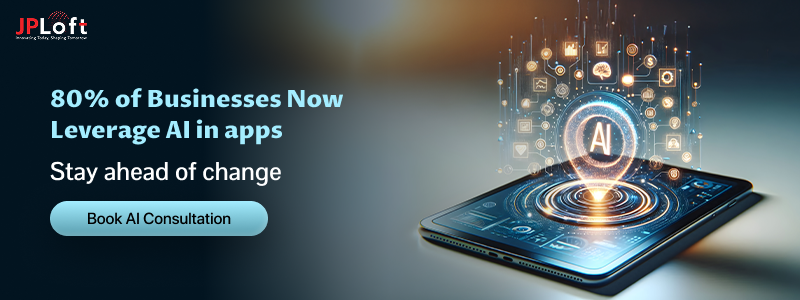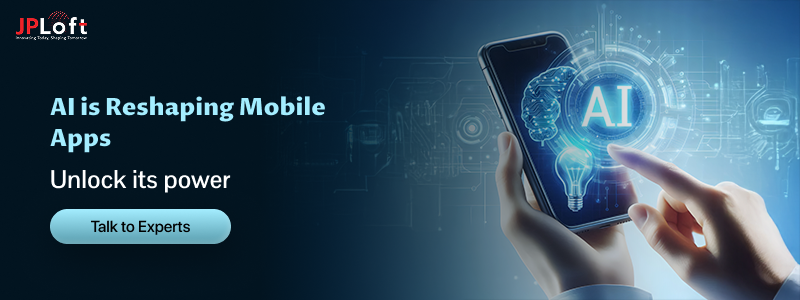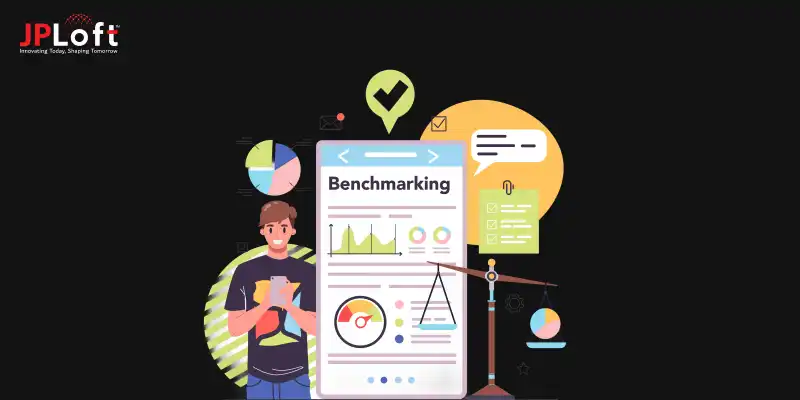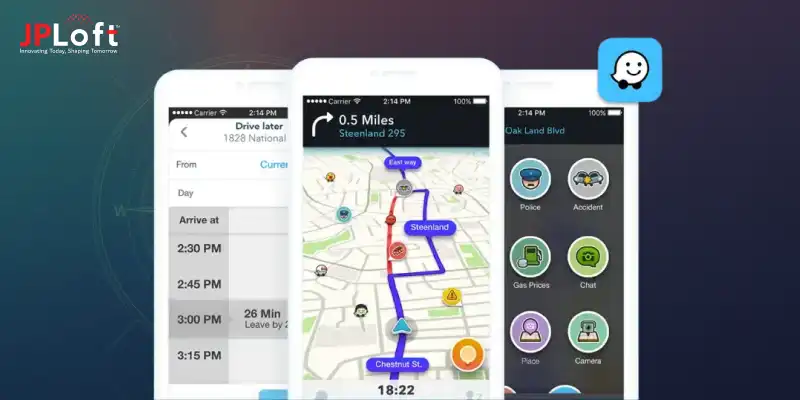AI in Mobile App Development – A Game Changer in 2026
"AI is not just another technology; it’s the electricity of the 21st century."- Andrew Ng
Mobile apps have come a long way from simple tools to intelligent digital companions. And at the heart of this evolution lies artificial intelligence in mobile app development. From Netflix recommending your next binge to Siri understanding your commands, AI is no longer futuristic; it’s already shaping how we interact with technology daily.
In mobile apps, AI is pushing boundaries, offering smarter personalization, advanced security, and even real-time decision-making. For businesses and developers, the role of AI in mobile app development is more than just adding features; it’s about creating apps that truly “think” with users. As we step into 2026, the impact of AI is clear: it’s not just enhancing apps; it’s revolutionizing them.
Key Takeaway:
AI in mobile app development empowers smarter personalization, security, and predictive insights that elevate user experiences.
Businesses can leverage AI to forecast trends, reduce costs, and build more user-centric mobile apps with better efficiency.
The role of AI in mobile app development is not limited to features—it accelerates testing, debugging, and faster delivery cycles.
From voice recognition to anomaly detection, AI ensures apps stay future-ready while meeting evolving market demands.
JPLoft stands out as a reliable partner for businesses looking to integrate AI-driven solutions into their next-generation mobile apps.
What is Artificial Intelligence? A Simple Explanation
Artificial Intelligence (AI) is the science of making machines think and act like humans. In simple terms, it’s about giving computers the ability to learn, analyze, and make decisions just like we do.
From chatbots answering questions to recommendation engines suggesting what you should watch or buy, AI has already slipped into our everyday lives. For businesses and developers, understanding AI is now a key part of building smarter solutions, something often emphasized in any mobile app development guide, as AI has become an essential element of modern apps.
At its core, AI relies on algorithms, data, and machine learning models to recognize patterns, solve problems, and even predict outcomes. Unlike traditional software that follows fixed rules, AI systems can adapt and improve over time. That’s what makes them so powerful.
AI is everywhere, in healthcare apps that detect conditions, retail apps that recommend products, or banking apps that prevent fraud. Businesses that once focused only on features now think in terms of intelligence. And as we’ll see ahead, the use of AI in mobile app development is shaping the future of how apps are built and used.
For developers, mastering these concepts goes hand-in-hand with understanding frameworks, tools, and even strategies outlined in resources like mobile app testing, ensuring apps perform smartly and reliably.
What Does AI in Mobile App Development Really Mean?
When we talk about AI in mobile app development, we’re not just referring to fancy tech buzzwords. It’s about embedding intelligence into apps so they can learn, adapt, and improve with every interaction.
Imagine an app that not only follows instructions but also anticipates your needs, like a fitness app adjusting workouts based on your performance or a shopping app recommending products before you even search. For instance, businesses exploring how to create an app like Fetch Rewards can clearly see how AI-driven recommendations and rewards systems enhance user engagement.
AI in apps goes beyond simple automation. It brings in personalization, natural language processing, predictive analytics, and even image or voice recognition.
Unlike traditional development, where features remain static, the implementation of AI in mobile app development allows apps to evolve with user behavior. This shift creates smarter, more engaging experiences that keep users coming back.
Another key aspect is how AI helps developers. With AI-powered analytics, testing tools, and monitoring systems, developers can build an AI app faster, detect errors earlier, and enhance security more effectively. From streamlining user onboarding to creating personalized dashboards, AI becomes a co-pilot in the entire development lifecycle.
In short, the impact of AI in mobile app development is redefining what users expect. Apps are no longer just functional; they’re becoming companions that think, learn, and grow.
AI in Mobile App Development Today: Where Do We Stand?
The mobile app industry has entered a new era with AI becoming less of an add-on and more of a necessity.
Here’s a breakdown of the current state of AI in mobile app development:
1] Widespread Adoption Across Industries
AI is no longer limited to tech giants. Retail apps recommend products, healthcare apps detect conditions, and finance apps monitor fraud in real time. Developers planning new solutions often start with a mobile app prototyping process to test how AI features can be integrated seamlessly before full-scale development.
2] Shift From Features to Experiences
Earlier, apps were built with static features. Today, the impact of AI in mobile app development is seen in dynamic experiences; personalised feeds, intelligent chatbots, and adaptive interfaces that evolve with users. Ambitious businesses are even exploring how to build a super app, combining multiple features into a single intelligent ecosystem.
3] Growth of Generative AI
With the rise of generative AI in mobile app development, apps are becoming more creative. From AI-driven content creation to personalized product designs, generative models are unlocking innovative ways for apps to engage users. This trend is expected to dominate industries like gaming, design, and e-commerce.
4] AI-Driven Development Tools
AI isn’t just transforming the user side; it’s also reshaping how apps are built. Tools for testing, debugging, and analytics now come with AI assistance, making development cycles faster and more efficient. For development teams, aligning AI capabilities with the right frameworks and tools is essential to ensure scalability and performance.
5] Rising Global Demand
From startups to enterprises, demand for smarter apps is booming. Reports show billions being invested in AI-powered applications, with regions like the U.S. leading adoption. No surprise that “AI in mobile app development USA” has become a hot trend, as companies compete to leverage AI for competitive advantage. Businesses also consult mobile app monetization strategies to ensure sustainable AI-driven growth.
The Role of AI in Mobile App Development: Explained
The role of AI in mobile app development goes beyond adding “smart” features; it’s about reshaping the way apps are designed, built, and experienced. Here’s how AI plays a defining role today:
1. Personalization and User Experience
AI enables apps to deliver hyper-personalized experiences. Think of Spotify suggesting playlists based on your mood or fitness apps tailoring workout routines. This level of personalization is only possible because of artificial intelligence in mobile app development, which continuously learns user behavior to refine recommendations. For businesses exploring innovative solutions, resources like the best mobile app ideas often highlight how personalization can drive engagement and customer loyalty.
2. Smarter Search and Navigation
Modern apps use AI to power voice search, image recognition, and predictive text. This makes navigation effortless and user-friendly. For instance, shopping apps let you search by photo, while finance apps offer voice-enabled commands. The implementation of AI in mobile app development in search functions is redefining usability standards worldwide.
3. Security and Fraud Detection
Another important role of AI in mobile app development is related to app security. By analyzing behavior patterns, AI can detect unusual logins or transactions instantly, protecting users in real-time. Businesses aiming to safeguard platforms often turn to strategies similar to the 'how to protect your platform with background verification system approach, ensuring stronger user trust.
4. Predictive Analytics for Businesses
The impact of AI in mobile app development is also visible in predictive analytics. Apps forecast what users might want next, helping businesses plan inventory, marketing, or customer support more efficiently. With AI, decision-making becomes data-driven rather than guesswork.
5. Driving Innovation with Generative AI
Another emerging role is generative AI in mobile app development, which empowers apps to create content, whether it’s product descriptions, marketing copy, or even design variations. For developers, this means faster creativity cycles and more engaging apps. Teams looking to experiment often begin with mobile app wireframing to map where generative AI fits within the user journey.
6. AI-Powered Automation
The use of AI in mobile app development extends to automating repetitive tasks like customer support, onboarding, and even app testing. This reduces manual effort, speeds up development cycles, and ensures better scalability for businesses. With automation, teams can focus more on innovation instead of repetitive workflows.
7. Revolutionizing Industries
Can AI in mobile app development create revolution across industries? The answer is yes. From healthcare apps enabling faster diagnoses to retail apps offering virtual try-ons, AI is redefining what apps can achieve and how deeply they can transform user interactions. This industry-wide impact is pushing companies to adopt AI-driven strategies to stay competitive.
8. AI and ML Integration in the USA Market
The adoption of AI and ML in mobile app development is particularly strong in the USA, where startups and enterprises are using AI to stay ahead of the competition. From AI-driven fintech apps to eCommerce platforms, the AI in mobile app development USA market showcases how businesses can unlock massive growth with intelligent solutions.
After considering the role of AI in mobile app development, now, let’s look forward to the key benefits, in the following section.
Why Use AI in Mobile App Development? Key Benefits Explained
The use of AI in mobile app development is no longer just about adding cool features; it’s about creating smarter, faster, and more user-centric applications. Here are the top benefits businesses and developers can’t ignore:
A] Smarter Personalization
AI helps apps analyze user behavior to deliver tailored content and experiences. From e-commerce apps recommending the right products to streaming platforms suggesting shows, personalization keeps users engaged. Developers exploring this advantage often start with a mobile app design to ensure AI features are aligned with intuitive interfaces.
B] Enhanced Security
The implementation of AI in mobile app development also boosts security. By tracking unusual activity, AI detects fraud, prevents unauthorized logins, and strengthens data protection. Combining AI with mobile app security offers users peace of mind in a highly digital world.
For instance, industries like logistics and defense where learning how to build a drone control app also requires secure navigation and data protection, are increasingly turning to AI safeguards to prevent cyberattacks.
C] Predictive Insights for Businesses
AI allows apps to forecast trends and user needs through predictive analytics. For instance, ride-sharing apps predict demand in certain areas, while retail apps suggest restocking items. The impact of AI in mobile app development here is huge; businesses save costs while users enjoy seamless service.
D] Voice and Image Recognition
Voice commands and image-based searches are now common in mobile apps. From banking apps with voice authentication to shopping apps that let you search with a picture, AI is making apps more accessible. For developers, careful planning ensures these recognition features are seamlessly integrated into the user journey.
E] Faster Development with AI Tools
AI isn’t just for the end-user; it also supports developers. Automated testing, debugging, and analytics powered by AI make building apps quicker and more efficient. With growing demand, many teams refer to the top mobile app development companies in the USA to see how leaders are integrating AI for faster innovation.
How Much Does It Cost to Add AI in Mobile App Development?
The cost to integrate AI features into an app can range from $20,000 to $100,000+, depending on scope, region, and complexity.
Unlike traditional apps, the implementation of AI in mobile app development requires specialized tools, data models, and expertise, which can significantly impact the budget.
Let’s break it down:
► Type of AI Features
|
AI Feature Level |
Description |
Estimated Cost (USD) |
|
Basic AI Features |
Chatbots, voice search, and simple recommendation |
$8,000 – $20,000 |
|
Intermediate AI Features |
Image recognition, predictive analytics |
$20,000 – $50,000 |
|
Advanced AI Features |
Generative AI models, NLP systems |
$50,000+ |
For startups, exploring a mobile app development cost guide can help in estimating budgets before choosing features.
► Data and Infrastructure
AI thrives on data. Setting up secure storage, APIs, and data pipelines adds to costs. The impact of AI in mobile app development is only as strong as the data infrastructure behind it. Cloud solutions (AWS, Azure, GCP) can reduce upfront expenses but increase long-term operational costs.
Additionally, reviewing the cost to develop a storytelling app like Wattpad
Can provide insights if your app will include personalized content or recommendation engines.
Businesses also reference the cost to build a car listing platform like DubiCars to benchmark infrastructure and scalability requirements for high-data apps.
► Development Team and Expertise
Hiring skilled AI developers and data scientists is a significant investment. Many companies prefer to hire dedicated developers who specialize in AI, ensuring faster development cycles and reliable solutions.
► Maintenance and Updates
AI-powered apps require constant tuning, retraining, and updates. The use of AI in mobile app development means ongoing costs are higher compared to static apps. Factoring in AI-specific mobile app maintenance is crucial for long-term success.
Well, the cost to integrate AI into an app may seem costly, but the return on investment often outweighs the expense thanks to improved engagement, smarter analytics, and long-term scalability.
What’s Next for AI in Mobile App Development?
The mobile app industry is evolving at lightning speed, and AI in mobile app development is set to play a pivotal role in shaping the future.
Here’s what we can expect in the coming years:
1. Smarter, More Adaptive Apps
Apps will no longer just react; they’ll predict. AI will enable apps to anticipate user needs, suggest actions, and even automate routine tasks. The role of AI in mobile app development will expand beyond personalization to creating experiences that feel almost human. For developers, careful planning will be essential to ensure these advanced features are seamlessly integrated into the overall user experience.
2. Expansion of Generative AI
Generative AI is poised to revolutionize content creation within apps. From automatically generating text, images, or videos to designing dynamic UI components, the generative AI in mobile app development trend will empower developers to deliver richer and more interactive experiences. This opens doors to creativity and engagement levels we’ve never seen before.
3. Integration with Emerging Technologies
AI will increasingly integrate with AR, VR, IoT, and blockchain to create truly immersive and intelligent apps. Businesses will look to futuristic solutions, referencing a mobile app tech stack to ensure AI works seamlessly with other cutting-edge technologies.
4. Increased Focus on Security and Compliance
As apps become smarter, data privacy and security will remain top priorities. AI will help identify vulnerabilities, detect fraud, and automate compliance measures. Developers will need to combine AI and ML in mobile app development to safeguard both user data and business operations.
5. Democratization of AI
Finally, AI tools will become more accessible, allowing even smaller businesses and startups to build intelligent apps without massive budgets. This democratization could answer the question: Can AI in mobile app development create a revolution?' and the answer seems to be a resounding yes. Specialized AI apps, like those for autonomous devices or niche industries, will flourish as technology becomes more approachable.
Add AI to Your App with JPLoft, a Leading Mobile App Development Company
Ready to transform your mobile app with AI? JPLoft is here to help. As a trusted mobile app development company, we specialize in building intelligent, user-centric apps that leverage the latest AI technologies. From predictive analytics and chatbots to generative AI features, our team ensures your app stands out in a crowded market.
With JPLoft, you don’t just get a development partner, you get a team that understands your users, anticipates trends, and delivers solutions that drive engagement and growth. Let’s bring your vision to life and make your app smarter, faster, and more intuitive. Connect with us today and explore the future of AI-driven mobile apps.
Conclusion
AI is no longer a futuristic concept; it’s a driving force in mobile app development. From personalization and predictive analytics to generative AI and smarter security, Artificial intelligence in mobile app development is transforming how apps are built and experienced. Businesses that embrace AI gain a competitive edge, delivering apps that are not only functional but intelligent, adaptive, and user-focused.
As technology continues to evolve, the possibilities are endless. Whether you’re a startup or an established enterprise, integrating AI thoughtfully can enhance engagement, streamline operations, and unlock new growth opportunities. Can AI in mobile app development create a true revolution? The answer is yes, and the future of mobile apps is intelligent. Now is the time to step in, innovate, and harness AI to its fullest potential.
FAQs
AI enhances app functionality by enabling personalization, predictive analytics, intelligent automation, and smarter user interactions. It makes apps more adaptive, engaging, and efficient.
AI analyzes user behavior to deliver personalized content, smart recommendations, and intuitive interfaces, resulting in smoother navigation and higher user satisfaction.
Yes. By automating repetitive tasks, optimizing resources, and predicting user needs, AI helps businesses save time, reduce errors, and cut costs.
Popular AI types include machine learning, natural language processing, computer vision, and generative AI, each enhancing different app functionalities.
While AI can benefit most apps, its implementation is particularly valuable for apps that handle large datasets, user interactions, or require personalization and predictive features.
AI adoption is expected to increase, with innovations like generative AI, smarter analytics, and more advanced predictive tools shaping next-generation apps.













Share this blog